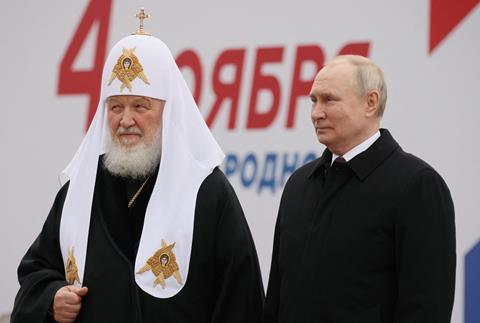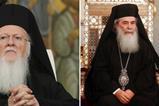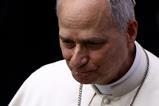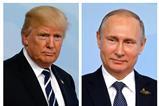The head of the Russian Orthodox Church, has said that Jesus Christ did not oppose the death penalty. Andreja Bogdanovski explains the context behind this surprising statement

In the wake of Putin’s invasion of Ukraine, the Russian Orthodox Church has transformed, embracing a militant ideology and positioning itself as the ultimate moral authority in Russian society as it wages an ideological war against “Western degradation”.
Accordingly, Russian Patriarch Kirill’s latest indirect approval of the reinstatement of the death penalty should not be seen as a standalone event but rather as a building block positioning the Church as a key feature of Putin’s ideological landscape.
What exactly did he say?
While speaking to a Russian veteran’s group at the beginning of the month, the leader of the Russian Orthodox Church, which commands the largest number of Orthodox Christians in the world, stated that the church was not against the death penalty.
“The church has never condemned the death penalty if it was carried out according to the law, but, of course, it has never endorsed it either,” reported Ukrainska Pravda.
The Russian Patriarch attempted to justify this controversial reasoning by saying that “Jesus Christ did not condemn the death penalty, even though he himself unjustly suffered it.”
Speaking about how this can translate to Russian society, Kirill used cautious wording such as capital punishment being indeed considered an extreme measure such that it would be “ideal for people not to commit such crimes that would be followed by the death penalty.”
In cases where the person is an extreme danger to society and cannot be isolated then, “he must be removed.” The Russian Patriarch stated that he supports the temporary ban on the death penalty as long as the crime rate is down.
Is the death penalty already legal in Russia?
Russia suspended the death penalty in the 1990s as it was a condition set by the Council of Europe to join the organisation. However, it has not been entirely outlawed, as it is still part of the country’s legislation. In 2022, Russia was removed from the Council of Europe due to its military action in Ukraine following widespread international criticism and imposition of sanctions.
Why the debate now?
The Crocus Hall terrorist attack that took place outside Moscow in March with over 140 deaths is one of the reasons behind the reintroduction of the death penalty. Prominent Russian voices have ever since openly discussed such a possibility.
TV personalities, such as Vladimir Solovyov, have also advocated for its application but in the context of Russia’s war in Ukraine. A well-known propagandist, Solovyov called for the return of the death penalty in response to the sluggish advances of the Russian military, and collapse of strategy, in Ukraine. “Unfortunately, we have no death penalty. Because for some, it is the only solution,” he stated in 2022.
Patriarch Kirill’s boost of the discussion is another way to impose societal authority, whether in the trenches in Ukraine or responding to dissent at home.
Unlike the Catholic Church, which is governed by one central figure in Rome, authority in the Orthodox world is dispersed. Many Orthodox churches essentially serve as national churches directed by patriarchs. As a steadfast ally of Putin, Patriarch Kirill is instrumental in supplying the ideological justification for Russia’s military actions in Ukraine.
What’s been the response so far?
Andrey Kuraev, a Russian theologian known for his critical stance toward the Russian Orthodox Church and who was defrocked by Patriarch Kirill in 2020, considered Kirill’s statement to be in direct support of Putin’s plans to reintroduce the death penalty.
“The apostles did not condemn hard drugs. And not a word was said against torture. There are no texts condemning any military aggression in general or British conquests. Does this mean that all these actions are compatible with the Sermon on the Mount?”
Following the controversial comments from Patriarch Kirill, a statement was subsequently made by Vladimir Legoida, the official spokesperson of the Russian Orthodox Church who downplayed the seriousness of what was said by the Russian Primate, saying it had been given a “scandalous dimension” in the media.
“The Church has always welcomed the moratorium on the death penalty, including as an opportunity for pastoral work with those sentenced to life imprisonment,” Legoida stated.
In contrast, the Catholic Church under Pope Francis took decisive steps to oppose the death penalty by revising the Cathecism (codified doctrine) in 2018. Accordingly, the death penalty became “inadmissible because it is an attack on the inviolability and dignity of the person” which was a departure from the position of the previous Pope (John Paul II) in the 1990s, where it was still permitted.
Will the death penalty be restored in Russia?
There are two potential interpretations regarding the implications of Patriarch Kirill’s remarks.
This may be a narrative crafted for quick media gain, serving as a distraction from the bigger picture: the growing opposition to the Russian Orthodox Church among members of the Ukrainian Orthodox Church (UOC), which has traditionally been allied with it.
Several bishops of the UOC sent a letter against the Russian Orthodox Church earlier in the month disagreeing with the decision to place Russian clergy in the occupied regions in Ukraine and dismiss the Ukrainian clergy there.
However, after Ukraine successfully attacked and seized parts of the Kursk region inside Russia, Putin would undoubtedly benefit from greater public militarisation of minds and an increase in morale without the need to announce all-out mobilisation and officially declare a state of war against Ukraine.
The death penalty comments came straight after Patriarch Kirill showed frustration that ordinary Russians who live away from Ukraine prefer to ignore the realities of the war zone and opt to prioritise their personal wellbeing.
“Many are not ready to give up their personal comfort and usual level of prosperous life,” the Russian Patriarch said.
At the same time, the Russian Orthodox leader spoke of increasing fatigue among Russians.
“After almost three years of active military operations, we see there’s a certain weariness among our fellow citizens of reports from the front lines.”
After Patriarch Kirill cleared the religious obstacles, the reinstatement of capital punishment may realistically be integrated into Putin’s methods for quelling dissent. Therefore, the Russian Orthodox Church’s involvement in the matter is needed to soften the shock to ordinary Russians and test public reactions ahead of a potential official revival.






































No comments yet